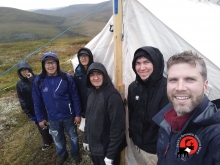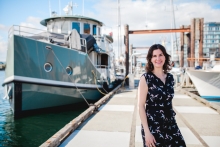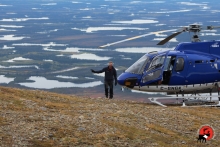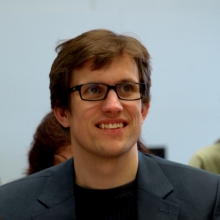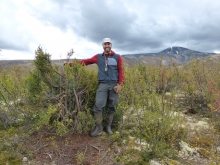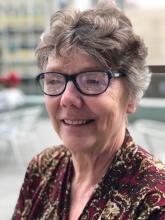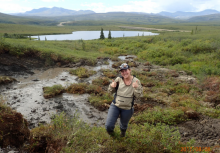Congratulations to all our current and past Fellowship and Assistantship award winners!
Award winners by year
Congratulations to all our 2019 Fellowship and Assistantship award winners!
To see recipients from 2018 and past years click here or scroll to the bottom of the page.
Research Assistantship Recipients (2019)
Marcel Babin, Université Laval, Takuvik joint laboratory (CNRS-ULaval)
Nunataryuk WP4: Satellite Tracking of the Organic Matter in the Mackenzie Delta, Impact of Climate Change on Permafrost Thaw
Marcel's research focuses on how global warming is affecting a broad spectrum of marine and terrestrial environments in high northern latitudes and the implications for human welfare and culture. Recent findings show that ancient permafrost-originating carbon is more reactive than previously thought and can thus be rapidly utilized by marine microorganisms, with possible CO2 release to the atmosphere via respiration. Whether or not the Arctic Ocean will be a net sink or source of the greenhouse gas CO2 in the near future, as permafrost continues to thaw, is not clear but Marcel's research aims to investigate this further.
Édouard Bélanger, Gwich'in Renewable Resources Board (GRRB)
Dall's Sheep Research Project
Édouard's research is a community-based project that aims to provide essential information about Dall sheep populations to the Gwich'in Renewable Resources Board. In the initial planning stages community workshops were held to consult with community members on the project design and methodology. Using remote cameras the project will assess lamb recruitment, the lambs:ewes ration, and nursery and ram group classification on a yearly basis.
Gwénaëlle Chaillou, Institut des Sciences de la Mer de Rimouski (ISMER) Université du Québec à Rimouski
Nunataryuk WP4: Coastal Groundwater Discharges (CGD)-derived Carbon Fluxes, Impact of Climate Change on Permafrost Thaw
Gwénaëlle's research is part of the international Nunataryuk program, that focuses on the impacts of thawing land, coast and subsea permafrost on the global climate and on humans in the Arctic. Her research focuses on the transport and transformation of newly mobilized terrestrial organic carbon into Arctic coastal waters. The Mackenzie delta provides an ideal site including a variety of carbon, ranging from modern vascular plants to ancient/aged carbon-included permafrost. Coastal groundwater discharge is a major conveyor of freshwater and terrestrially derived solutes from the land toward the ocean.
Emmanuel Devred, Bedford Institute of Oceanography, Fisheries and Oceans Canada (DFO)
Nunataryuk WP4: Satellite Tracking of the Organic Matter in the Mackenzie Delta, Impact of Climate Change on Permafrost Thaw
Emmanuel's research is part of the the international Nunataryuk program. Global warming has acute effects in the Arctic that impact both marine and terrestrial ecosystems. The thawing of the permafrost, mainly composed of “old” organic carbon, may increase the amount of newly mobilized organic matter (OM) toward the Arctic Ocean. This will alter how the marine ecosystem functions and the coastal environment. The Mackenzie River and Delta have a drastic increase in OM fluxes that reach the Beaufort Sea. Fisheries and Oceans Canada monitors three marine protected areas (MPAs) that are crucial habitats for marine mammals (beluga) in the Mackenzie Delta -Beaufort Sea region and central to Inuvialuit culture.
Maeva Gauthier, University of Victoria
Nuna Tariuq Silalu Film Project: Food Security, Global Environmental Changes, and Resilience in the Canadian Arctic, Using Participatory Video Method
Maeve's research uses a community-based participatory approach to engage the community of Tuktoyaktuk around the issue of microplastics and plastics in their environment, traditional foods, and climate change. Using a combination of qualitative participatory methods, youth participants share their perceptions of plastic waste, climate change, and their vision of current and future policy actions. She focuses on perceived food security, social and environmental justice and how these issues might affect the livelihoods and traditional foods of youth in Tuktoyaktuk.
Research Fellowship Recipients (2019)
Édouard Bélanger, Gwich'in Renewable Resources Board (GRRB)
Dall's Sheep Research Project
Édouard's research is a community-based project that aims to provide essential information about Dall sheep populations to the Gwich'in Renewable Resources Board. In the initial planning stages community workshops were held to consult with community members on the project design and methodology. Using remote cameras the project will assess lamb recruitment, the lambs:ewes ration, and nursery and ram group classification on a yearly basis.
Maeva Gauthier, University of Victoria
Nuna Tariuq Silalu Film Project: Food Security, Global Environmental Changes, and Resilience in the Canadian Arctic, Using Participatory Video Method
Maeve's research uses a community-based participatory approach to engage the community of Tuktoyaktuk around the issue of microplastics and plastics in their environment, traditional foods, and climate change. Using a combination of qualitative participatory methods, youth participants share their perceptions of plastic waste, climate change, and their vision of current and future policy actions. She focuses on perceived food security, social and environmental justice and how these issues might affect the livelihoods and traditional foods of youth in Tuktoyaktuk.
Sabrina Lakhani, University of British Columbia
Preparing for the Changing Nature of Work in the Mining Industry
Sabrina’s current research interests focus on the changing nature of work in the mining industry. Her project intends to understand the potential change to the concept of shared-value with the adoption of future mining technologies within the context of the Northwest Territories.
Kirsten Reid, Department of Geography, Memorial University
The Influence of Biotic and Abiotic Latitudinal Gradients on Tree Range Expansion in the Subarctic
Kirsten's research is to assess the role of cross-scale (latitudinal to local) biodiversity patterns and abiotic gradients as non-climatic drivers of tree range expansion. The data collected will be used to make predictions about how the boreal-tundra ecotone will respond to continued climate change, and how tree species may expand their ranges. This will provide information about the future biodiversity of the tundra (including animals, understory vegetation, and trees). Increased disturbance to caribou habitat may result in decreased abundance of lichens and plants that serve as caribou subsistence. Consequently, the range and spatial distribution of caribou may be negatively affected. For northern communities, this has implications for traditional uses of caribou.
Research Assistantship Recipients (2018)
Franz Krause, University of Cologne, Germany
On the Land and in the Water: Connecting and Disconnecting the Mackenzie Delta
Franz is studying current uses and meanings associated with the Mackenzie Delta, focusing on people living around Aklavik. This will include information on people's livelihood practices, mobility, and senses of belonging, in particular in relation to the delta's social and ecological volatility and people's creative responses.
Steven Mamet, University of Saskatchewan
Permafrost and Ecological Change in the Eastern Selwyn/western Mackenzie Mountains
Steven is researching to gain an improved understanding of both vegetative and environmental limiting factors in the North. He will study what increasing temperatures, longer growing seasons, and thawing permafrost mean for subarctic environments and plant communities.
Mary Ollier, University of Ottawa
On the Land with Project Jewel: A Community-Based Research Project in the Inuvialuit Settlement Region.
Mary is seeking to understand if/how on-the-land programming offers culturally safe experiences that meet the self-identified needs of the residents of the Inuvialuit Settlement Region. Land-based initiatives for Aboriginal populations are intended to reinforce cultural identity and enhance resiliency. This project will draw upon the experiences of participants in the IRC's program Project Jewel.
Lia Ruttan, Independent Scholar
"We had a good mind to do it": Oral Histories of Aboriginal Forest Firefighters from Ft. Smith, NT
Lia is studying oral histories of aboriginal people about fighting forest fires in Fort Smith. Dene Elder Mary Heron, described the need to carry out one’s responsibility to the animals, lands, and waters. She went on to say, that fighting fire from this perspective brought good results, pride and good energy. Aboriginal forest firefighters from the Ft. Smith region agreed and initiated a request for research to explore, preserve and share their experience, knowledge and techniques.
Research Fellowship Recipients (2018)
Rebecca Goodwin, University of Western Ontario
Things Past, Things Present: Inuvialuit Perspectives on Gender and the Material Record
Rebecca will use ethnographic methods in her study to document the relationships that Inuvialuit descendant communities have with “gendered” objects, both archaeological and modern. She seeks to include an Inuvialuit perspective on gender within the larger conversation about gender in the arctic past.
Erin MacDonald, University of Alberta
Carbon Composition and Microbial Activity in Permafrost-affected Terrains
Erin will study how thaw slumps impact microbial community diversity in impacted-streams, and characterize organic carbon at multiple depths from different landscapes, and how this affects the rate of carbon decomposition. Permafrost thaw can release vast amounts of organic carbon, but the rate of decomposition will depend on both the microbial community and the type of the carbon material.
Mary Ollier, University of Ottawa
On the Land with Project Jewel: A Community-Based Research Project in the Inuvialuit Settlement Region
Mary is seeking to understand if/how on-the-land programming offers culturally safe experiences that meet the self-identified needs of the residents of the Inuvialuit Settlement Region. Land-based initiatives for Aboriginal populations are intended to reinforce cultural identity and enhance resiliency. This project will draw upon the experiences of participants in the IRC's program Project Jewel.
Mike Palmer, Carleton University
An Investigation of the Factors Inhibiting the Chemical Recovery of Yellowknife Area Lakes from 50 years of Arsenic Pollution
Mike is researching catchment and within-lake processes that are impeding the natural recovery of lakes after mining activity. Lakes near historical mining operations in the Yellowknife area continue to show signs of arsenic contamination almost 60 years after the bulk of arsenic was deposited across the landscape from legacy ore roasting operations.

